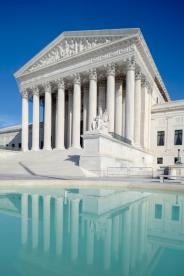The U.S. Supreme Court has held that to prevail in a disparate treatment claim of discrimination under Title VII of the Civil Rights Act of 1964, a rejected applicant for employment must only show that his or her need for religious accommodation was a motivating factor in the employer’s decision, not that the employer had knowledge of the applicant’s need. Justice Antonin Scalia wrote the opinion for the Court. EEOC v. Abercrombie & Fitch Stores, Inc., No. 14-86 (June 1, 2015).
Background
The applicant, a practicing Muslim, consistent with her understanding of her religion’s requirements, wore a headscarf while interviewing for a position with a retailer. However, she was rejected in accordance with the employer’s “Look Policy,” which banned all headgear, religious or otherwise, from being worn on duty. Otherwise, she appeared qualified for the position, according to the interviewer.
The Equal Employment Opportunity Commission brought suit on the applicant’s behalf, alleging a violation of Title VII of the Civil Rights Act of 1964, which prohibits a prospective employer from refusing to hire an applicant because of the applicant’s religious practices when the practices could be reasonably accommodated without undue hardship.
The EEOC won in the district court, but the Tenth Circuit court of appeals, in Denver, reversed, granting the employer summary judgment instead. The Supreme Court granted review.
Supreme Court Decision
Contrary to the court of appeals, the Supreme Court held Title VII does not require showing that the prospective employer had “knowledge” of the applicant’s need for religious accommodation before the employer could be held liable for religious discrimination in hiring. Instead, according to the Court, Title VII bars prospective employers from acting on certain motives, regardless of the employer’s knowledge. Therefore, the prospective employer cannot make an applicant’s religious practice, confirmed or otherwise, a factor in its employment decisions. An employer who acts in order to avoid accommodating an individual protected by Title VII may violate the law even if it “has no more than an unsubstantiated suspicion that an accommodation would be needed,” the Court said.
In so concluding, the Court rejected an argument that a failure to accommodate an applicant’s religious practice must be raised in a disparate impact claim, rather than a disparate treatment claim. That would have been true, the Court said, if Congress had limited the meaning of “religion” in Title VII to religious belief, so that discrimination based on a particular religious practice would not be intentional disparate treatment, though it might be unintentional disparate impact. However, Congress used a wider definition of religion in Title VII. It includes “all aspects of religious observance and practice, as well as belief.”
The Court further concluded that with respect to religion, an argument that a neutral policy cannot constitute “intentional discrimination” is unavailing. “Title VII,” the Court said, “does not demand mere neutrality with regard to religious practices—that they be treated no worse than other practices. Rather, it gives them favored treatment, affirmatively obligating employers not ‘to fail or refuse to hire or discharge any individual … because of such individual’s’ ‘religious observance and practice.’” Neutral policies may have to yield to the need for religious accommodation, it said, remanding the case for further consideration consistent with its opinion.
Unlike the Americans with Disabilities Act, where the statute expressly requires an accommodation only for “known” disabilities, under Title VII, applicants or employees do not necessarily need to notify employers of their religious-based need for an accommodation. If there is an unexpressed religious need for the accommodation and the employer allegedly intentionally failed to accommodate the religious need, the applicant or employee may file a charge with the EEOC and bring suit claiming unlawful discrimination under Title VII. Then, in the case of an applicant, the employer’s hiring process, along with its relevant policies, may come under scrutiny for signs that the prospective employer at least had an “unsubstantiated suspicion” that, had it hired the individual, it would have to offer an accommodation under Title VII it did not wish to make.





 i
i

